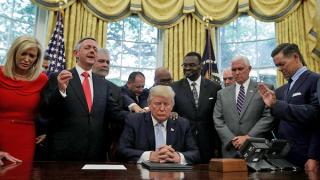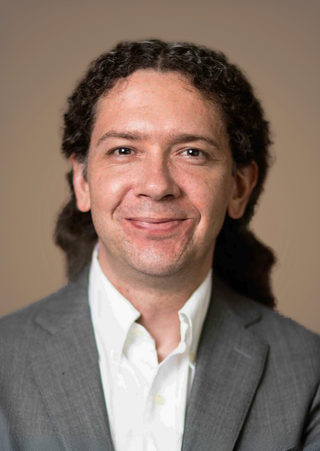Scott Morrison is the first Pentecostal Christian in the world to lead a democratic country. But Donald Trump’s presidency is far more infused with Pentecostalism than Morrison’s prime ministership is.
Morrison and Trump are both leaders who have adapted to their political environments. Morrison is not talking to a devoutly Christian nation. He must reach a much larger audience than Christian conservatives, an audience that may be wary of his exuberant faith.
Trump is perhaps the least pious president in living memory. Yet he rose to the presidency because he could speak to Christian conservatives like no one else. And he particularly appealed to Pentecostal and charismatic Christians, to whom he is a vessel of God and a possible fulfillment of prophecy.
Trump is perhaps the least pious president in living memory. Yet he rose to the presidency because he could speak to Christian conservatives like no one else.
Pentecostal media entrepreneurs flocked to Trump early on, when leaders of powerful churches were still suspicious of him. Like Trump, they can command audiences of millions without having to rely on traditional institutions. They have since moved from the political fringe of conservative Christianity to a dominant position.
Pentecostals are often lumped into the category of evangelicals. What distinguishes them from other evangelicals is their emphasis on the Holy Spirit. The physical nature of Pentecostal worship is about feeling the power of the Holy Spirit in the same way Jesus’s disciples did.
Speaking in tongues, faith healing, prophecy and miracles are all “gifts of the spirit” in Pentecostalism. Pentecostals are more likely than other Christians to believe we are living in the End Times, and that a spiritual war between light and darkness is being waged all around us.
While other churches historically shunned Pentecostalism because of its mixed-race origins and overt embrace of the supernatural, many non-Pentecostal Christians known as charismatics have adopted Pentecostal practices themselves. These charismatic movements have spread spirit-filled Christianity throughout other denominations, including Catholicism.
Supreme court justice Amy Coney Barrett is part of a charismatic Catholic community. Tens of millions of Brazilians are charismatic Catholics, including the president, Jair Bolsonaro. There are more than half a billion Pentecostal and charismatic Christians worldwide, and around 68m in North America, according to a report from the Center for the Study of Global Christianity.
In 2016, Trump promised to protect Christians from their enemies, which he could do because he wasn’t “politically correct”. It didn’t matter that he wasn’t an exemplary Christian.
The ecstatic practices of Pentecostalism have profoundly influenced American culture. It is no accident rock music looks so much like Pentecostal worship. Elvis Presley, Little Richard, Jerry Lee Lewis and Marvin Gaye all drew on the styles of their Pentecostal upbringings.
Charismatic Christianity was a natural fit with 60s and 70s counterculture. Charismatics weren’t into the politics of the hippies, but shared their desire for authenticity and disdain for conformity.
In 2016, Trump promised to protect Christians from their enemies, which he could do because he wasn’t “politically correct”. It didn’t matter that he wasn’t an exemplary Christian. Many Christians saw their vote for Trump as a defiant countercultural act in a country dominated by secular hostility.
Evangelical support for Trump is widespread, but Pentecostals and charismatics are more likely to see God at work in his presidency. A study earlier this year found 29% of white evangelicals agreed that Trump was anointed by God to win the 2016 election; 53% of white Pentecostals agreed.
A fixation on the prophetic significance of Trump has led to a dangerous overlap between some charismatic Christians and the QAnon conspiracy theory.
Trump knows how to talk to his Pentecostal and charismatic supporters. His decision to clear a church square of protesters so he could pose there with the Bible appealed to their sense of spiritual warfare. He has talked about the end of the Covid-19 pandemic in terms of miracles. He even declared his own infection a “blessing from God”.
Trump is relying on the enthusiasm of these supporters to get him over the line in 2020. But his focus on them may be damaging his appeal to everyone else.
Trump is relying on the enthusiasm of these supporters to get him over the line in 2020. But his focus on them may be damaging his appeal to everyone else.
In Australia, the 2017 same-sex marriage plebiscite showed religious conservatives are a minority in most of the country. There was speculation in 2019 that Morrison could win religious votes with his display of personal faith, but research has found no evidence religion shaped the vote.
Pentecostals and charismatics are about 2% of Australia’s population. They are demographically diverse, and their religious conservatism doesn’t always translate into political conservatism. Trump-style appeals are not a political option for Scott Morrison.
Unlike Trump, Morrison has had a lifetime of prayer. But also unlike Trump, he defers to the dominant worldview of scientific rationality. He declared his belief in miracles on election night, but he doesn’t suggest they’ll end the pandemic.
As a native speaker of religious language, Morrison uses that language a lot more subtly than Trump. Morrison promises to “burn for” the Australian people. Trump says “there will be no God” if Biden is elected.
The difference between the two leaders is the difference between the two countries. Even if we want to see drastic change in Australia, we don’t want to see the apocalypse.






